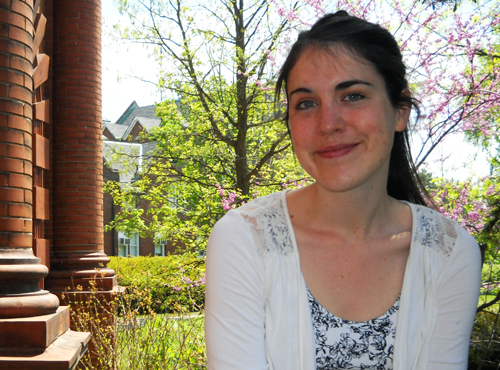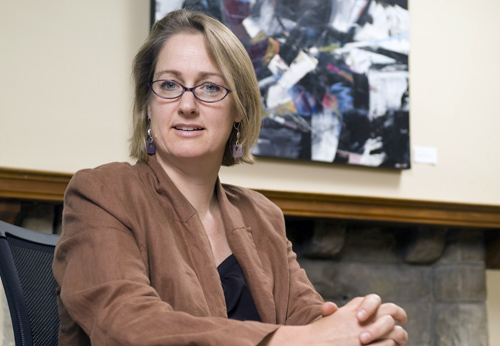
Unless they’re at dance school, few grad students use dance to explore their research. But that’s what Andrea LaMarre did last spring as a student investigator with U of G’s Research Shop. She’s one of numerous grad students who have worked with the unit on campus, part of Guelph’s Institute for Community Engaged Scholarship (ICES).
The Research Shop matches student interns with projects involving agencies and organizations around Guelph and Wellington County. In effect, the shop sometimes becomes the research arm for those groups, which are often unable or unwilling to retain their own investigators for certain projects.
“Sometimes they lack a research perspective or capacity, and that’s what we’re able to do,” says ICES director Linda Hawkins.
She founded ICES and the Research Shop in 2009 along with Prof. Kerry Daly, former dean of the College of Social and Applied Human Sciences. The shop is located at 17 University Avenue East at the north end of campus.

Various agencies have used the program, including the City of Guelph, Wellington-Dufferin-Guelph Public Health, the Guelph-Wellington Task Force for Poverty Elimination, and the Wellington Guelph Drug Strategy.
Ron MacKinnon, executive director of the Community Resource Centre in Fergus, Ont., has turned to the Research Shop for work on poverty and youth homelessness in Wellington County. Without the shop on campus, his agency would have to find more money to pay for research and it would take longer to complete projects. “We’re usually focused on the day, the week, the month. We don’t have the time or expertise to do research or evaluations,” he says.
Up to 30 students at a time – mostly grad students – are involved with the Research Shop. They’ve looked at affordability of public transit, regional drug abuse prevention and treatment, violence against women, and poverty elimination and emergency food access.
They work alone or in teams, alongside PhD students who serve as project managers. Interns work on average five hours a week, usually for a nominal stipend. “It’s like an apprenticeship model, with those who have experience conceptualizing and conducting community-based research getting new experiences in different contexts while learning to support more junior students in working at research in the community,” explains Hawkins.
Those research interns get a chance to broaden their scholarly skills beyond their particular academic specialty. So far, more than 100 students have taken part in at least that number of projects, looking into issues and providing reports and recommendations to the partner organizations or collaborations.
“Rapid response” projects, typically lasting only a few weeks, involve policy-makers and front-line staff looking for quick information. Longer projects lasting six months to a year often involve a staff or faculty member as well as students.
Most projects involve the social sciences, but some initiatives draw in other areas of campus from the School of Environmental Design and Rural Development to the departments of Food Science and Population Medicine.
LaMarre answered a call for interns during the final year of her undergrad here in sociology. She’s now completing her master’s in the Department of Family Relations and Applied Nutrition (FRAN). “I was interested in community-based projects because I felt it was important to connect with the community as opposed to keeping research knowledge in the academy.”
Most of her work has involved the Wellington Guelph Drug Strategy, a collaboration of agencies that includes the police service, school boards, community health and public health. LaMarre has looked at housing for people seeking addiction treatment, harm reduction strategies for young people and withdrawal management services in the region.
She says her work has helped the group’s partners tailor services for community needs and develop recommendations for the local integrated health network.
Her harm reduction studies sparked a call from another Waterloo agency looking to use one of her reports. “That was really exciting to me because it meant someone was actually engaging with the research,” says LaMarre.
Last spring she combined her research with her artistic interests in ballet and contemporary dance. Working with Georgia Simms of IMAGEO Artworks and Musagetes Guelph, LaMarre looked into political and community engagement. Besides writing a report, she worked on a dance performance intended to express those ideas. Then she danced in the piece, called Invisible Hands, along with other performers during the Guelph Contemporary Dance Festival.
LaMarre will begin a PhD in the fall. Working with FRAN professor Carla Rice, she helps young women recovering from eating disorders to create short multimedia films about their experience.
Hawkins says the Research Shop program prepares students for full-time work. A recent survey of current students and grads found that one out of three interns had landed jobs while studying. “Their confidence in their ability to get jobs is huge,” she says. “They’re already talking and working with future employers.”
For many interns, volunteering with the program and pursuing their academic specialty offers mutual benefits. Warren Dodd connects his work on poverty issues as a Research Shop intern with his current PhD studies in food security, health and labour migration in southern India and now Honduras.

He started working with the shop after beginning his grad studies in early 2012. “I saw the Research Shop as an opportunity to build my research skills and to learn more about community-engaged scholarship and community-based research,” he says.
He looked at emergency food services with the local poverty elimination task force. “There have been a number of positive outcomes from this project, including the creation of The Seed community food hub committee,” says Dodd, who now sits on a poverty task force subcommittee. “This committee has the mandate to bring a community food hub to Guelph to transform the way emergency food is provided.”
Now a PhD candidate in epidemiology and international development, he’s working with Profs. Cate Dewey, population medicine, and Sally Humphries, director of Guelph’s international development studies program. Their project partners with an agency in Honduras that prizes community engagement and participation. “I am hopeful that I will be able to continue doing community-engaged research in some capacity,” says Dodd.
Hawkins adds: “Community-based research has a huge history on campus, but we want to make it more responsive beyond individual faculty or classroom projects.” She also hopes to involve more students from science and engineering disciplines.